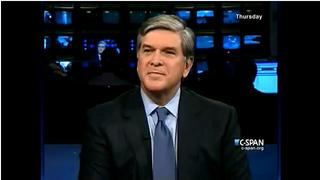NAB Chief Smith: Retrans Preserves Programming
WASHINGTON: Retransmission is not broken and certainly doesn’t need fixing, broadcast lobby chief Gordon Smith said Saturday evening on C-SPAN’s talk series, “The Communicators.” Smith, president and CEO of the National Association of Broadcasters, managed to work in a defense of retrans in answer to whether or not free TV had been “broken by the Internet.”

“No, because of retransmission consent, just as cable and satellite ask for payment of their produced content, we ask for the same consideration when they take our content and put it through their pipes or bounce it off their satellites, we feel like we’re owed something,” Smith said. “I think it’s important to remember that of all the programming Americans watch, in a majority it is broadcast content. People like to watch things live, they like the Super Bowl, they like baseball, like ‘24,’ ‘The Office,’ ‘The Mentalist.’ All these things are very expensive to produce.”
Retrans is TVs hot potato in Washington right now. Federal regulators are considering a rewrite of the rules governing how pay TV providers gain carriage access to over-the-air broadcast signals. Natch, folks are taking sides. Republican commissioner Robert McDowell and House Commerce Committee Chairman Fred Upton (R-Mich.) both have objected to further retransmission regulation.
Smith, a former Republican senator from Oregon, agreed.
“While there is a rare interruption, the truth of the matter is, 99 percent of these negotiations are carried out without interruption on a market basis,” he said.
Ironically, one such disruption had commenced just hours before, when the retrans contract between LIN TV and Dish Network expired. LIN said it pulled 27 local TV station signals from Dish systems at midnight on Friday. However, another retrans negotiation was settled last week before any contention was publicized. Sinclair Broadcast Group quietly cut a carriage deal with Comcast for 36 TV stations in 22 markets.
Smith deftly fielded a query about whether or not it was helpful to the NAB that Republicans had reclaimed the House.
“Our issues are not Republican and Democratic . . . they’re about the American people--news, weather, sports and emergency information they want to watch,” he said. “I find friends on both sides of the aisle. The fact of a divided government gives you a lot more procedural hurdles to utilize if you need to . . . when I served, I think I was viewed as a constructive conservative. I count many, many friends on the Democratic side of the aisle.”
The imposition of network neutrality rules by the Federal Communications Commission gave Smith concerns about over-regulation in general, he said.
“My hope is that the FCC will act in accordance with what they’ve said publicly, and that they don’t have the statutory authority to impose bringing arbitration or some new system that puts the government’s thumb on negotiation and tries to force a particular outcome,” he said.
With regard to spectrum, Smith noted that broadcasters relinquished nearly a third of their spectrum in the DTV transition.
“The ink’s hardly dry on the bill, and already the demand is ‘we need more,’” he said.
The Obama Administration is now seeking to repurpose 40 percent of the remaining TV spectrum for wireless broadband. It has proposed to do so before conducting a full survey of what is available and what’s in use. And while broadcasters have repeatedly been charged with “spectrum squatting,” Smith noted recent disclosures by Time Warner and Clearwire having “tremendous amounts” of unpurposed spectrum.
“You can call it hoarding if you want,” Smith said.
The FCC needs Congressional authority to hold its proposed incentive auctions, by which broadcasters who voluntarily relinquish spectrum would be paid a cut of the proceeds. But it does not need such authority to repack the broadcast spectrum, requiring TV stations to move to new channel assignments.
“Our hope is to keep ‘voluntary,’ voluntary, so that if you don’t volunteer to go out of business, that you’re not placed in an inferior band,” he said. “That you don’t lose multicasting, which is your foreign-language stations, religious stations, minority stations. We don’t want to lose the future of mobile television.”
Smith said mobile and multicasting represented “tremendous innovations” broadcasters have already sunk millions into. Repacking, “really just forced relocation,” he said, could put broadcasters into bandwidth with poorer coverage characteristics. Smith called upon TV manufacturers to improve reception capabilities.
Without ball-parking a overall percentage of how many broadcasters would bite on incentive auctions, Smith said cash-strapped operations would be tempted.
“I don’t know where they came up with needing another 120 MHz,” Smith said. “I don’t know why that number comes out of broadcasting, so somewhere between there and zero, there’ll be some broadcasters who are under water economically who’ll gladly agree to go out of business for a market fee.”
Smith also noted that in a “pay-go” environment, spectrum auction proceeds “were every legislators pay-for for everything. So when you put billions on the table, there’s a lot of claimants. So where will broadcasters fare? So I’ve said to those in broadcasting who may want to volunteer to make sure the check clears before you let go of your spectrum.”
-- Deborah D. McAdams
Get the TV Tech Newsletter
The professional video industry's #1 source for news, trends and product and tech information. Sign up below.
